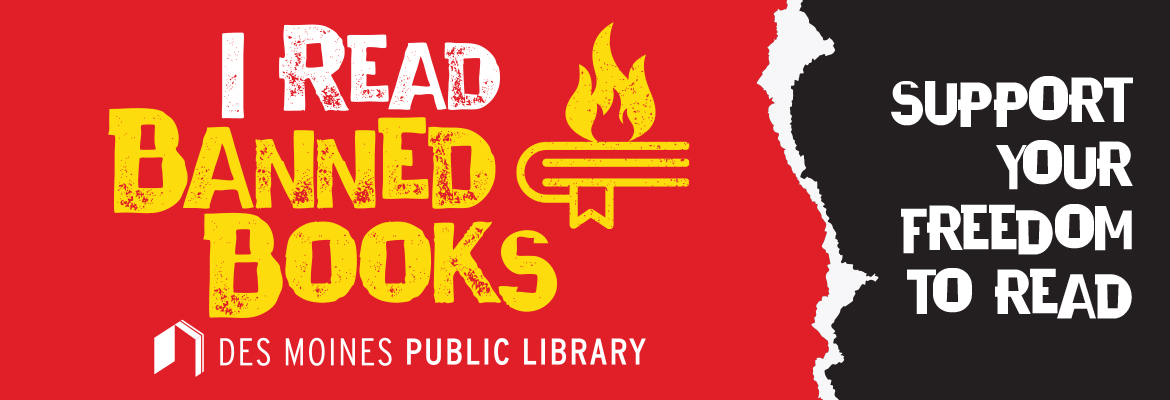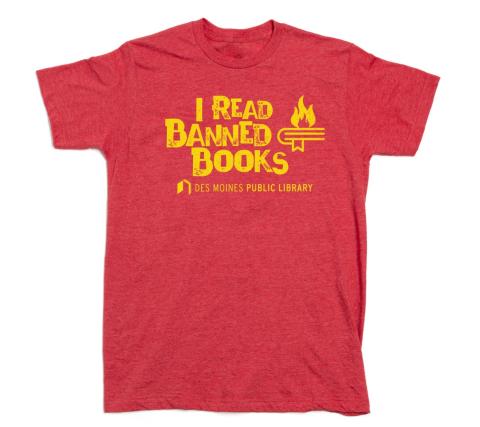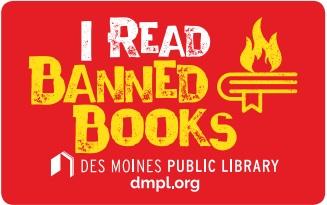
Each Banned Books Week, the Des Moines Public Library celebrates your freedom to read and educating the public on the harms censorship and book challenges can inflict in our communities.
Book challenges at libraries nearly doubled in 2022, according to the American Library Association. The troubling report cited 1,269 demands to censor library books and resource in 2022, a record high. The previous high was the 729 challenges reported in 2021. So far in 2023, this troubling trend continues, with an even higher pace of challenges to books in public and school libraries across the nation.
According to the ALA, "Of those titles, the vast majority were written by or about members of the LGBTQIA+ community and people of color."
Des Moines Public Library Director Susan A. Woody says it's important libraries take a stand against censorship of all kinds, as it is part of a library's mission to connect each individual with information and materials that they find important
"We consider equitable access to information a basic right for all. As a library, it is our responsibility and duty to uphold this right and challenge those who intend to infringe upon it," says Woody. "Intolerance has been spreading in recent years and the community looks to the library as a bastion of democracy and civility. We take that role very seriously and will defend our community’s right to read."
The Des Moines Public Library has a rich history and tradition of protecting your freedom to read. The National Library Bill of Rights (which you can read in its entirety here), was initially drafted by then-DMPL Director Forrest Spaulding in 1938. Spaulding drafted the document at a time when censorship of items/materials was becoming more common in the United States. The document was later adopted by the American Library Association and is a fundamental document for public libraries across America.
So what IS a banned/challenged book? You may here people say that a book isn't banned if someone can purchase it online or at a store. But for the Des Moines Public Library and libraries nationwide, any time a book ANYWHERE is challenged and/or removed from a public space - a school, a library, etc - this is an attempt at censorship, book banning, and thus goes against all we stand for. The Des Moines Public Library is proud of its legacy of protecting your freedom to read, which is why we celebrate and advocate for that freedom ... this week and every week. We are proud that you can find most, if not all, of these banned and challenged books at our library, and we advocate for access to these materials everywhere.
Q&A with Susan A. Woody
Q: Why is the subject of censorship and banned books important to public libraries?
A: Our library’s mission is all about connecting people with the ideas and tools they need to enrich their lives. That means we connect people to information and materials that are important to them as individuals. What is important to one person may be completely different than what is important to another. Our job is to provide materials and information to all people. We consider equitable access to information a basic right for all. As a library, it is our responsibility and duty to uphold this right and challenge those who intend to infringe upon it. Intolerance has been spreading in recent years and the community looks to the library as a bastion of democracy and civility. We take that role very seriously and will defend our community’s right to read.
Q: What history does DMPL have in fighting censorship?
A: We are very proud that DMPL Director Forrest Spaulding penned the original Library Bill of Rights in 1938. This document was ultimately adopted by the American Library Association. It speaks to freedom to read, equitable access to library resources, and resistance to censorship. Unfortunately censorship has been around for a long time, but we will continue to speak out against intolerance and censorship whenever and wherever it flares up.
Q: The American Library Association recently reported there were 729 attempts to remove materials from school, university, and public libraries in 2021 – the most in the 20+ years they’ve tracked that statistic. Does the current climate trouble you?
A: Of course. We should ALL be troubled whenever anyone, or any organization, strives to censor or challenge access to books and materials. The most recent wave of censorship has targeted youth literature. I firmly agree that parents should monitor their own children’s exposure to the world through the access points of books, media, entertainment choices, and the internet. For literature, the best way to do this is for parents to actually read some of the titles that are being challenged. If they did, they would read stories of resilience, alternative realities, and bravery. What better subjects to discuss with their kids? But this parental control must not extend beyond their own families. Every family has the right to choose what books and materials are appropriate for their own kids.
Q: What is the role of a public library in regard to information access?
A: Finding the books and materials that fill the needs of individuals and families is what the public library is all about. This is why we place such importance on the true professionals in the field – librarians. They are happy to work with all members of the community to find great books and resources that suit their individual needs and wants. Reading is crucial to a learned society. We read to understand each other. To learn about other cultures and ways of life that may be different from our own. We read to seek knowledge and think critically in order to make informed decisions. Reading teaches us empathy and tolerance instead of judgement and division. This is what a library provides.
Q: What banned books have you enjoyed?
A: One of my favorite banned books is Fahrenheit 451 by Ray Bradbury. The fact that he wrote this on a rented typewriter in the basement of a library gives me goosebumps. Imagine being surrounded by books and writing a book about burning them. Last, I have spent a lot of time in the past year reading LGTBQ+ literature to gain a better understanding of the objections being raised by the conservative leaning groups that are challenging them. What I discovered were stories of individuals bravely facing prejudice, bigotry, and racism. I am thankful to these authors for daring to tell their stories so that others may find solidarity with their with life struggles.
Events
BANNED BOOKS 101: Who, What, & Why?
Saturday, October 7, 11 AM | Franklin Junior High, 4801 Franklin Ave.
Join us for a special panel discussion on the importance of supporting your freedom to read at the Banned Books Festival, co-hosted by Beaverdale Books. Attendees will connect with organizations fighting censorship, get equipped with tools and resources to defend their rights as citizens and as parents, and learn how to combat book banning. The panelists are:
- Jackie Biger, University of Iowa professor
- Dr. Austin Baeth, Iowa State Representative
- Soneeta Mangra-Dutcher, Johnston School Board
- Daniel Gutmann, Urbandale School Board
- Kacyee Schippers, Annie’s Foundation
Banned Books Read-In
Monday, September 25, Central Library and Franklin Avenue Library
Celebrate your freedom to read at the library! We're taking advantage of a no-school day to learn more about banned books and having a read-in. There will be activities available all day long - and you might even win a prize! We'll also have frequently challenged books available if you'd like to sit and read for a while.
For teens and kids

As part of Banned Books Week, the Des Moines Public Library has created special "I Read Banned Books!" t-shirts. You can get yours at our library store.

Additionally, new cardholders will be able to receive a limited edition “I Read Banned Books” library card when they sign up for their card.